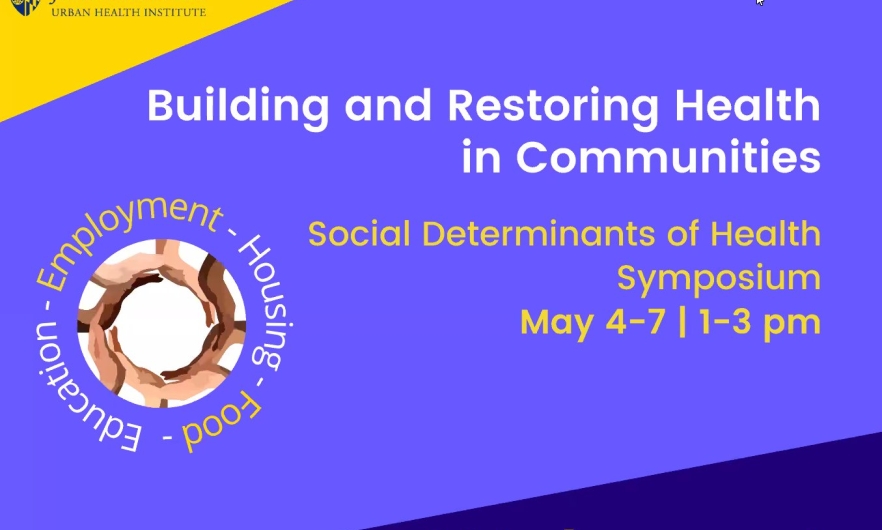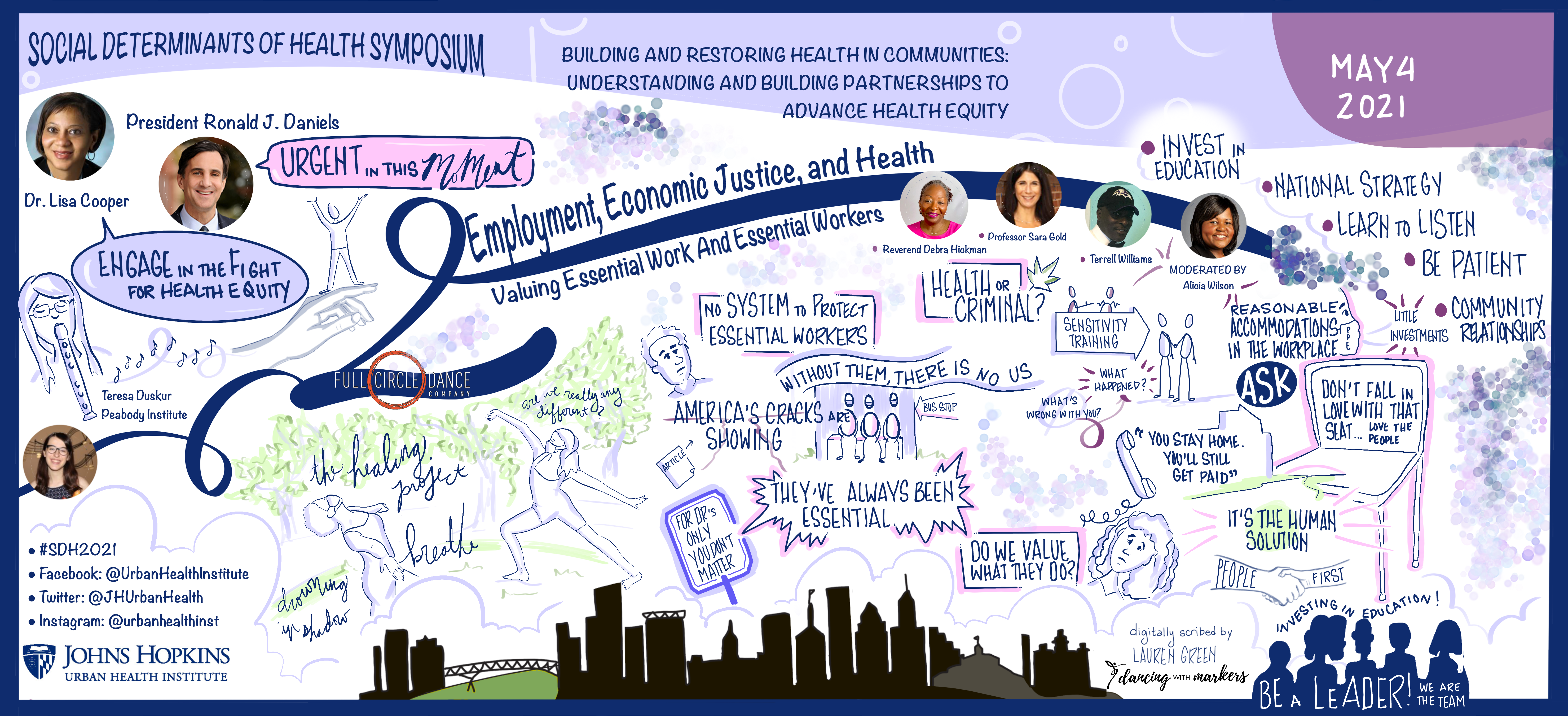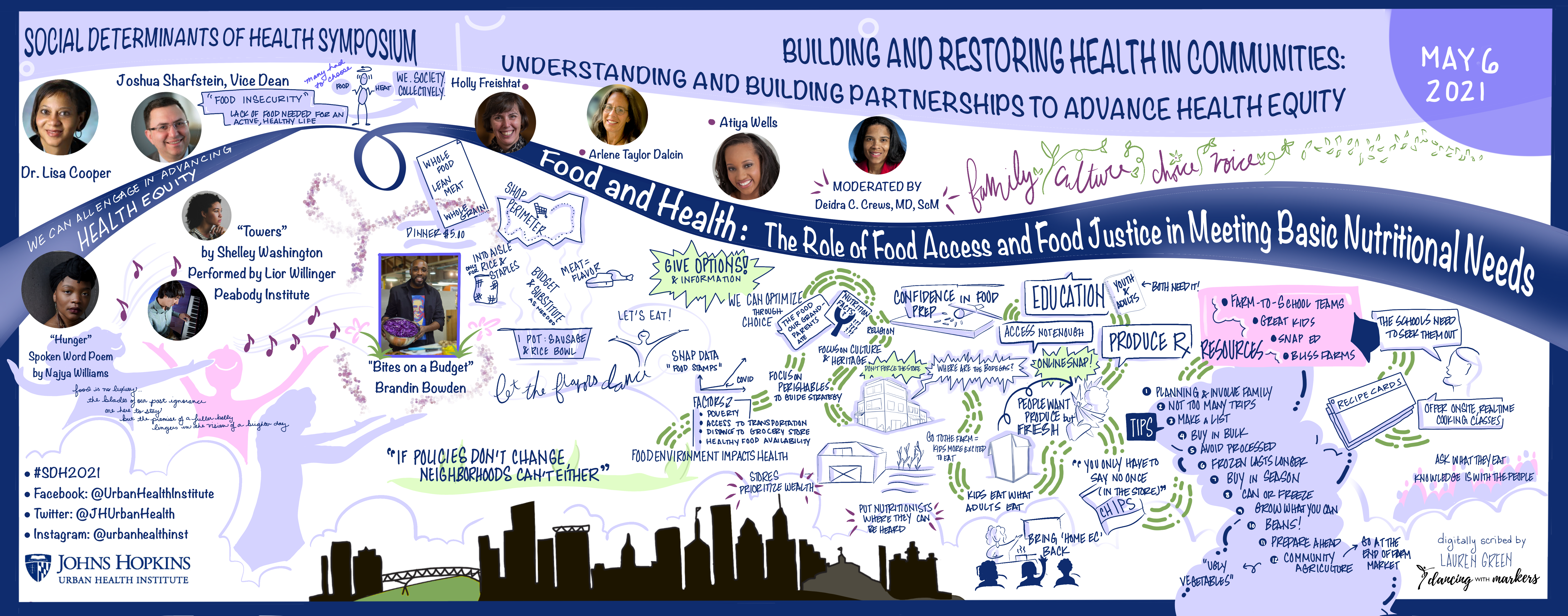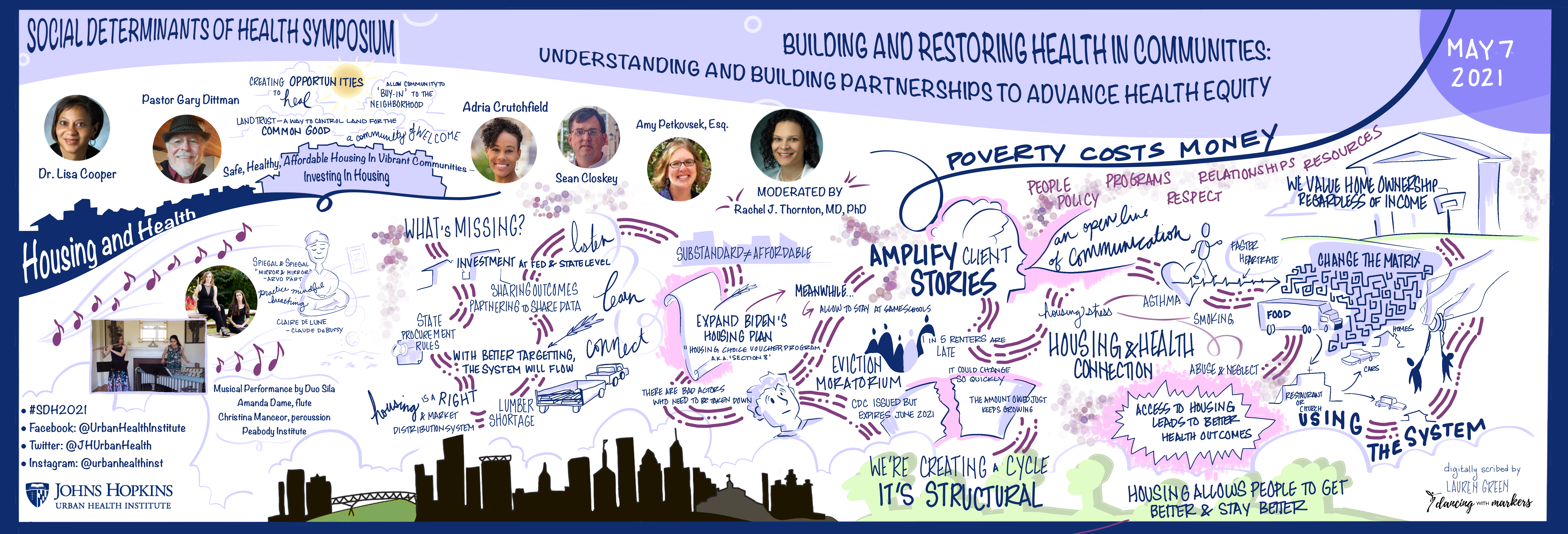2021 Social Determinants of Health Symposium

On May 4th the Urban Health Institute kicked off a four-day virtual Symposium entitled “Building and Restoring Health in Communities: Understanding and Building Partnerships to Advance Health Equity”. The Symposium focused on the impact employment, education, food, and housing have on the health of our communities and the benefits of building partnerships across institutions, government agencies, faith-based groups, and community-based organizations can have on advancing health equity. “We hope this Symposium will help you build stronger partnerships throughout Baltimore” shared Urban Health Institute director, Dr. Lisa Cooper, during her opening remarks.
Each day consisted of healing artistic expressions from local Baltimore artists including students of the Johns Hopkins University Peabody Institute, writer and artist Najya Williams, Baltimore Children's Choir, and Full Circle Dance Company. To watch videos of the Symposium, please visit our Youtube channel: bit.ly/SDH2021Videos

Employment / Economic Justice and Health
President Ronald Daniels kicked off day 1 with a few inspiring words of welcome “Today’s symposium makes clear no single institution or organization can tackle these monumental issues alone. It requires coordination and collaboration between governments Community organizations private industry and universities like Johns Hopkins that play key anchor roles in their communities.”
During the Valuing Essential Work and Essential Workers – Employment and Workforce Development as Health Equity Interventions workforce development experts, Rev. Debra Hickman, president of Sisters Together and Reaching (STAR), Professor Sara Gold, clinical law instructor at the University of Maryland Carey School of Law, and Terrell Williams, co-director, Turnaround Tuesday, signature campaign of the Baltimoreans United in Leadership Development (BUILD) discussed the importance of valuing essential workers and equipping them with resources to ensure they stay healthy and protected during the pandemic.
“Essential workers are those who keep us surviving. They keep life going when life happens to us. There is no infrastructure for them. We’ve got to protect them during this pandemic. There is no system in place currently.”, shared Terrell Williams.
Rev. Debra Hickman followed up with saying, “essential workers are the backbone of our society, yet there is nothing in place to make certain that they are getting the pay that is justified.”
Panelists also discussed some of the pre-pandemic challenges employees faced that increased once COVID-19 swept the globe. Professor Sara Gold talked about the harsh work conditions many essential workers were forced to endure such as not being able to take bathroom breaks and not receiving paid leave, “There’s been an increased focus on the needs of employees that have always existed, however, there are added complexities related to COVID-19. Amazon workers were not allowed to take urine breaks and had to pee in bottles. Fair wages - COVID-19 relief bill did not include a $15 minimum wage because it was not passed. Paid leave was not provided for workers infected with COVID or using paid leave for vaccinations.”
As the conversation continued, with moderator Alicia Wilson posing questions like “how can we address the issues that we discussed?” Panelists discussed the impact the culture and environment of a workplace can have on the health of its employees. Implementing policy change and resources, such as implicit bias training, paid leave, fair wages, and opportunities for advancing are some of the first steps they’d like to see employers take with their employees.
To watch the full discussions around employment and health during #SDH2021 please click here: Day 1

Education and Health
Day 2 of the Social Determinants of Health Symposium was all about education Provost Sunil Kumar shared a warm welcome “The last year has laid bare inequities in health, and therefore the social inequities in Baltimore, and the university needs to double down on its commitment to help address these iniquities.”
The Paying it Forward for Learners and Families – Investing in Equitable Access to High Quality Education Across the Life Course as a Health Intervention panel discussion included Dr. Sonja Santelises, CEO of Baltimore City Public Schools, Dr. Odis Johnson Jr., Bloomberg Distinguished Professor of Social Policy and STEM Equity and Executive Director of the Center for Safe and Healthy Schools, Khalilah Slater Harrington, Chief Program Officer of the Family League in Baltimore.
Moderator, Dr. Rachel Thorton, associate director of the Urban Health Institute, opened up the discussion posing this question to the group “What we have learned from the COVID-19 pandemic that could potentially help us innovate, health and education, as we go forward and as schools fully re-open?”
Dr. Santelises spoke about the importance of viewing parents and caretakers as partners in children’s education. Since the pandemic parents and guardians have had to take an active role in the schooling of their children with at distance learning. “That March when school got closed for the first time, in terms of physical space, the need for educators and families to partner together for the education of the City's children really was crucial.”She emphasized that nurturing relationships between caretakers and educators would be instrumental in health and education of students moving forward. “Families now have visibility into what that teaching and learning relationship looks like and I think if we leverage that positively. It can help propel schooling.”
Following up Dr. Odis Johnson Jr. shed light on how the pandemic gave educators a peek in to their students’ lives outside of the classroom. The pandemic put a spotlight on some of the inequities, digital divide, and food insecurities children and families are facing. “We also notice that a lot of inequities in the social determinants of education and health were made more visible more pronounced because of it. Before we didn't know much about the digital divide differences and access to internet service and internet providers. That's one thing that our school system had to immediately respond to.”
Panelists also discussed how to navigate youth trauma in educational spaces. Khalilah Harrington, shared, “It's (the pandemic) caused us to have real conversations I think in ways that we haven't previously had around trauma, around mental health, and around student engagement. Our young people have been enduring all of this […] we have now have the evidence […] and we have the right to say that there were great inequities.”
To watch the full discussions around education and health during #SDH2021 please click here: Day 2

Food and Health
Day 3 of the Social Determinants of Health Symposium focused on food and its relation to our health. “Food is no luxury or gift… Food is a home of heritage" recited writer and artist Najya Williams in her beautiful spoken word piece titled “Hunger”. Attendees also learned about cooking on a budget with a cooking demo, "Bites on a Budget,” by Nutrition, Integrative Health Educator, and 2019 Bunting Neighborhood Leadership Fellow Brandin Bowden.
Panelists on the Role of Food Access and Food Justice in Meeting Basic Nutritional Needs as a Precondition for Achieving Health Equity panel discussion started off by sharing what inspired them to become food justice warriors, educators, and advocates.
“What brought me to this work is somewhat related to my mom. I grew up in a single-family home in the ‘60s in Northwest Baltimore. And my mom worked full-time and because of her job, but probably more so her lack of interest in food and food preparation. It was the ‘60s where we ate a lot of TV dinners and canned vegetables.”, shared Arlene Dalcin, Research Associate at Johns Hopkins Medicine
Atiya Wells, 2021 Bunting Neighborhood Leadership Fellow and Executive Director, of Backyard Basecamp, BLISS Meadows also shared “I will say that my family also brought me to this work. I’m a descendant of sharecroppers. My father has chronic health issues. He has lupus, which really affected his kidneys. My mom passed away when I was 8 years old. I really learned at a very young age how to make healthy meals, and that has sort of carried throughout my life”
Similarly, Holly Freishtat Food Policy Director, Chief of Food Policy & Planning Division at the Baltimore City Department of Planning, spoke about her interest in food equity and nutrition being connected to her connection to someone living with chronic illness, “the motivating factor of what brought me to my work has really been my mother. I grew up with my mother chronically ill and quickly realized I may not be able to change her health, but I could change my health and I could change the environment. So, I studied nutrition and from learning about nutrition I got really interested in farming and growing food, and the culture of food.”
Panelists discussed how factors such as systemic racism contributes to the lack of access communities of color have to nutritional foods, such as fresh produce. “One thing that I remember vividly when I first moved down here is the lack of bodegas. There was none of that here in Baltimore. I didn’t know any of the terms like food desert or food apartheid. […] I noticed that there is so many challenges that come from systemic racism that creates the opportunity for communities of color to not have access to these things.” Shared Ms. Wells.
Suggestions provided from panelists ranged from implementing educational resources in schools for youth to learn how to cook healthy meals on a budget and increasing community outreach among nutritionists to policy and system changes such as increasing the monetary amount available for purchasing produce through the WIC program.
To watch the full discussions around food and health during #SDH2021 please click here: Day 3

Housing and Health
Day 4 of the Social Determinants of Health Symposium focused on the impact housing has on the health of our communities.
Pastor Gary Dittman from Amazing Grace Lutheran Church started us odd with a warm welcome and his vision of healthy neighborhoods. “...I suggest housing justice looks like employment testers and food access and education opportunities […] undoing systemic racism and creating communities with diverse opportunities and spaces, where connectedness and agency can occur,” he expresses.
The final panel, Safe, Healthy, Affordable Housing in Vibrant Communities – Investing in Housing as a Precondition for Achieving Health Equity, focused on the role housing plays in achieving health equity. Panelists, Adria Crutchfield, Executive Director of Baltimore Regional Housing Partnership, Sean Closkey, founding President of ReBUILD Metro, and Amy Petkovsek, Deputy Chief Counsel of Maryland Legal Aid discussed the need for investment in housing on the federal and state levels, data-driven decisions, and paths to both affordable rental housing and homeownership for low-income people.
Ms.Petkovsek notes, "...We need to start sending the message that we value homeownership, no matter how high or low your income is. I don’t think that’s the message that we’re sending across the board right now.”
Panelists highlighted that helping low-income families become homeowners will reduce housing inequities. While also emphasizing that every step of this process must include community voices and that these relationships are the best part of housing work.
“When we do planning, it starts in partnership with the community. When we fundraise, the community works on fundraising. When we select engineers, general contractors, and development partners, the community selects them,” says Mr. Closkey.
Ms. Crutchfield pointed to the impact lack of housing can have on someone’s mental health, “A level of stress is immediately alleviated when you address someone's housing need.”
To watch the full discussion around housing and health during #SDH2021 please click here: Day 4
